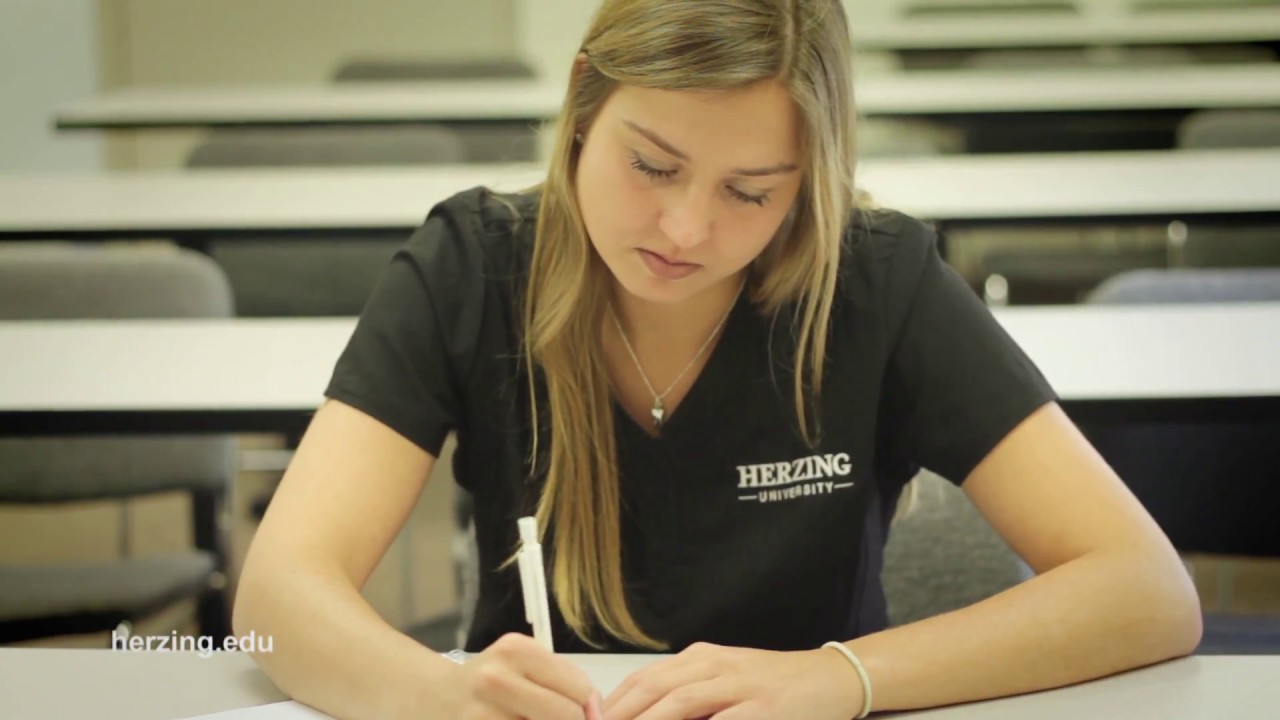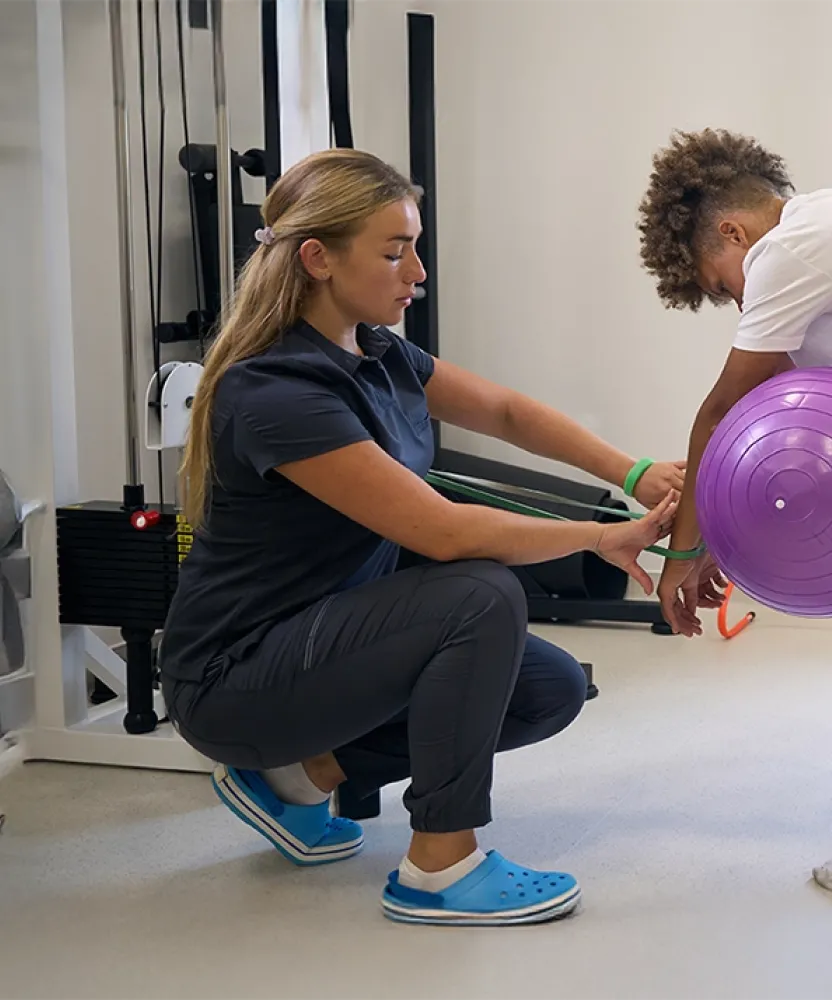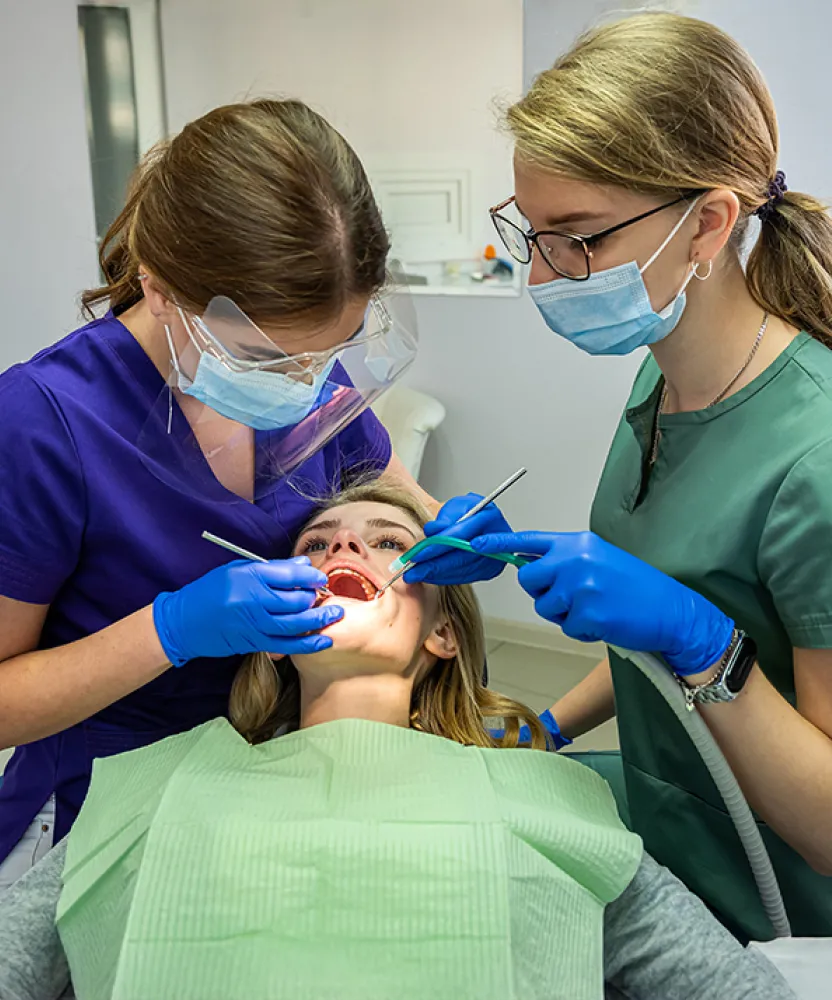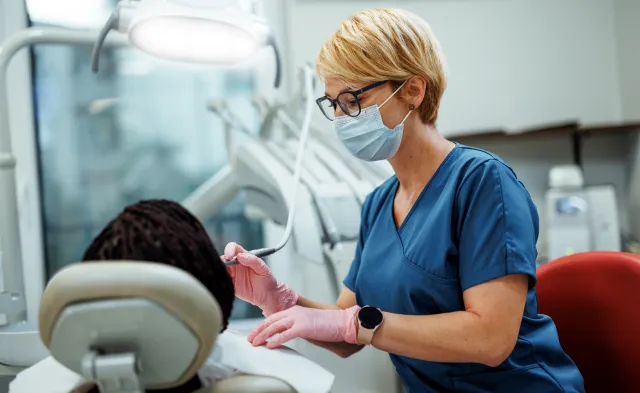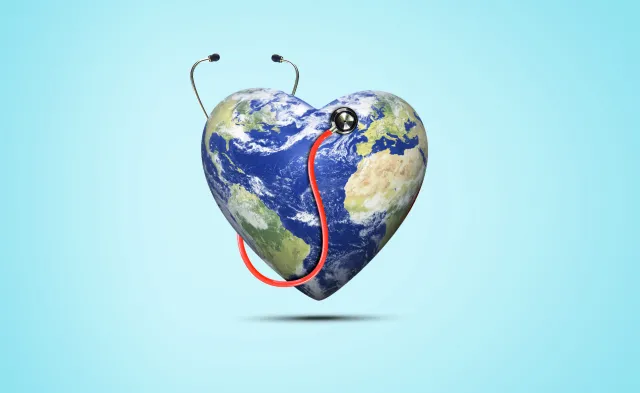Pathways
Follow your career pathway with Herzing
- Program length: 36 months
- Classes: View the curriculum
- Credential earned: Bachelor of Science in Dental Hygiene
- Program length: 12 months
- Classes: View the curriculum
- Credential earned: Bachelor of Science in Dental Hygiene
Earn a bachelor’s degree in dental hygiene and become possible
| Accreditation | Accredited by the Higher Learning Commission |
|---|---|
| Transfer credit | Transfer up to 90 approved credits |
| QuickPaths | Bridge option for licensed dental hygienists who have completed a CODA-accredited1 associate degree in dental hygiene |
| Career prep | Prepare to take the National Board Dental Hygiene Exam, Jurisprudence Exam, and the CRDTS Exam, which (upon successful completion) would provide you the opportunity to become a Licensed Dental Hygienist (LDH) in Minnesota. |
Learn More Today!
Available at the Minneapolis campus only
Choose Your Pathway in Dental Hygiene
Dental Hygiene degree options include undergraduate degree programs which prepare you to succeed in a career as a dental hygienist.
The degree programs at our Minneapolis campus provide fundamental knowledge and skills in dental and medical terminology, general and oral pathology, principles of dental radiography, radiography interpretation, and much more.
Ranked #10 Best Health Care Support Jobs of 2025 by U.S. News & World Report
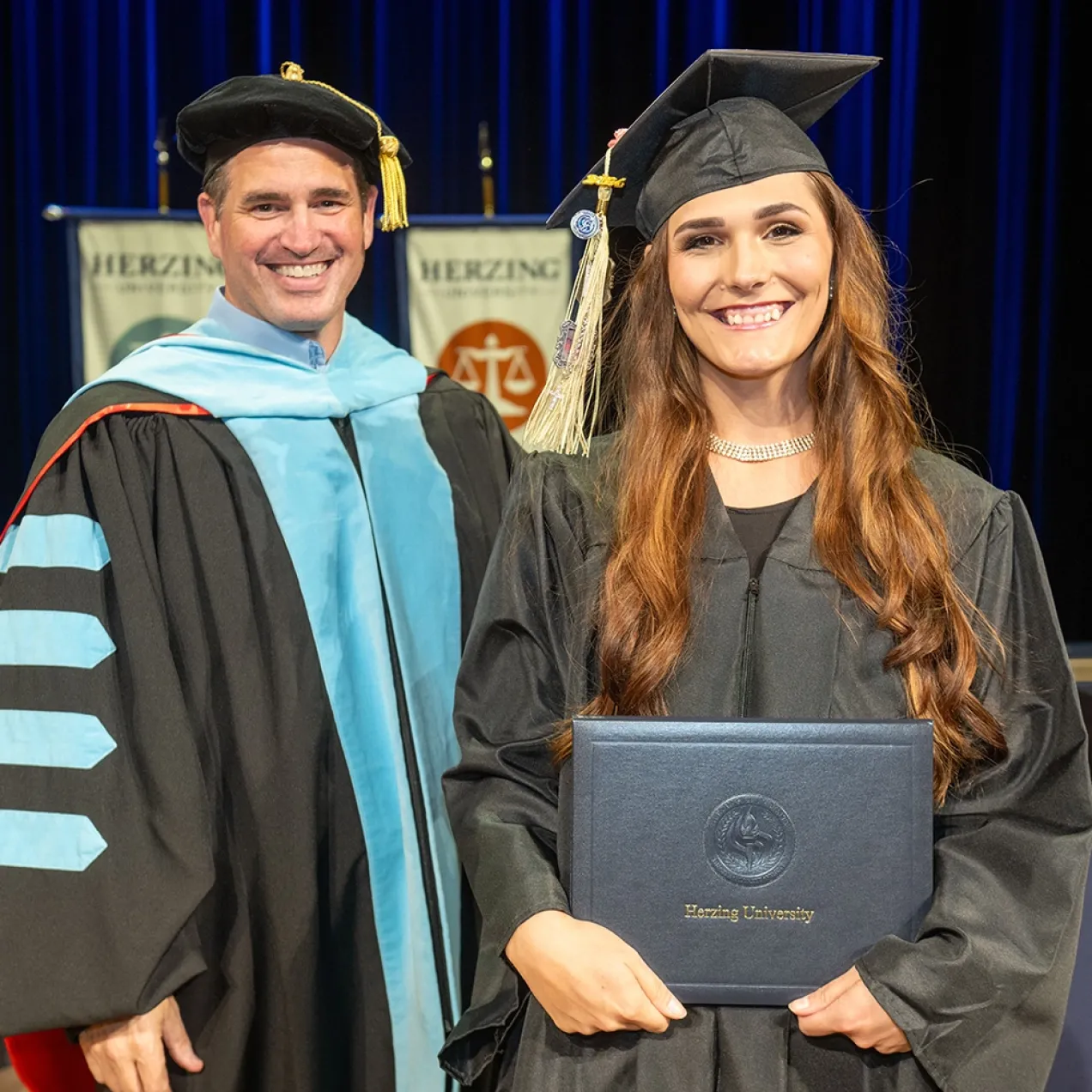
Career-focused curriculum
Discover the crucial knowledge and skills required to succeed in your work and build a foundation for continued career growth.
Flexible schedule
We work hard to help you maintain school-life balance, striving to be as flexible as possible for busy non-traditional students.
Experienced faculty
Get face-to-face instruction from experienced and credentialed faculty with real-world success in the field.
Lifelong support
We support your ongoing career advancement by providing comprehensive, personalized student services with lifelong career coaching.
Rolling admissions
No application deadlines to worry about. Apply when you’re ready and prepare to get started soon.
Earn Dental Assisting & Dental Hygiene Credentials in 4 Years
Prepare to stand out in the job market! Through Herzing University's unique dental pathway, you have the option to earn your dental assisting qualification in as little as 20 months, then continue earning a Bachelor of Science in Dental Hygiene while you work in your new career.
- Take advantage of priority enrollment into Herzing University's dental hygiene program with no waiting list!
- Earn two qualifications in the same time other schools prepare you for only one.
Earning My Dental Hygiene Degree From Herzing University
Herzing University is here to help change your life for the better. By enrolling, Herzing will work with you to help earn your degree and make you possible.
"To me having a small class size meant a lot. I went to a bigger university my first year, and I felt like I was drowning in a sea of students," says Micah Hallock.
Waived Enrollment Fee
Discover the educational pathway designed to maximize your career potential. Reach for greater heights with Herzing University.
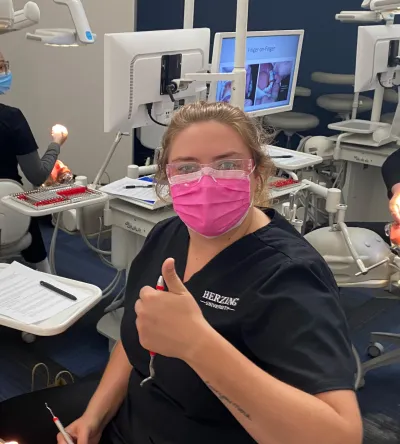
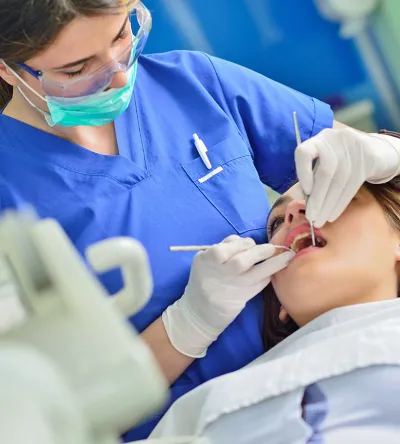
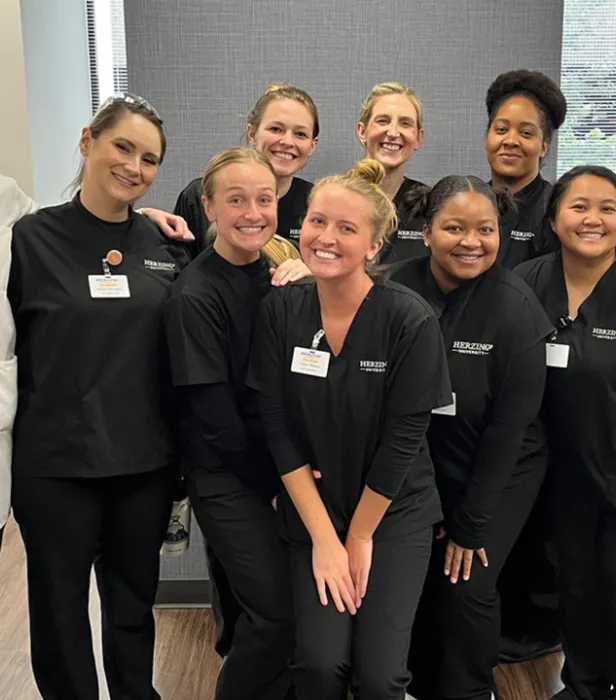
Your career as a dental hygienist
A minimum of an associate degree in dental hygiene is generally required for practice in a private dental office. A bachelor's or master's degree usually is required for research, teaching, or clinical practice in public or school health programs.
Dental hygienists remove soft and hard deposits from teeth, teach patients how to practice good oral hygiene, and provide other preventive dental care. They examine patients’ teeth and gums, recording the presence of diseases or abnormalities and provide periodontal scaling and root planning. Hygienists may prepare clinical and laboratory diagnostic tests for the dentist to interpret. Hygienists sometimes work chair side with the dentist during treatment.
Dental hygienists work in a variety of settings including private practices, group practices, and community clinics. Flexible scheduling is a distinctive feature of this job. Full-time, part-time, evening, and weekend schedules are widely available. Dentists frequently hire hygienists to work only 2 or 3 days a week, so hygienists may hold jobs in more than one dental office. More than half of all dental hygienists worked part-time – less than 35 hours a week.
According to the Bureau of Labor Statistics, it ranks among the fastest growing occupations. The demand for dental services will grow because of population growth, older people increasingly retaining more teeth, and a growing focus on preventative dental care. To meet this demand, facilities that provide dental care, particularly dentists’ offices, will increasingly employ dental hygienists to perform services that have been performed by dentists in the past.
Dental hygienists must be licensed by the state in which they practice. Nearly all states require candidates to graduate from an accredited dental hygienist school and pass both a written and clinical examination. The American Dental Association’s Joint Commission on National Dental Examinations administers the written examination, which is accepted by all states and the District of Columbia. State or regional testing agencies administer the clinical examination. In addition, most states require an examination on the legal aspects of dental hygiene practice. Alabama is the only state that allows candidates to take its examinations if they have been trained through a state-regulated on-the-job program in a dental office.
The Student Experience at Herzing
My journey definitely paid off! I’m looking forward to teaching the next generation of Dental Hygienists at a local Technical College -- they hired me before I even finished my program!
Rita M. Peters
Healthcare Student | Minneapolis CampusI came to Herzing at the age of 23. I wanted to be able to go to school in just 2 years and be done. I knew that I did not want to do hard labor for the rest of my life, but that seemed to be where I was going. I always thought I was not smart enough for the dental hygiene program. However, that was not the case at all. My family, teacher and fellow students were a tremendous support. I just needed to apply myself at Herzing, and it has paid off. I love it, and I love my job!
Tommy Mans
Healthcare Student | Minneapolis CampusI am a mother of two and I work full-time. While this is challenging at times, I am a firm believer that anything is possible and nothing is easy! You have to work hard for what you want and you will achieve!
Jennifer Turnquist
Healthcare Student | Minneapolis CampusI love the dental hygiene program! I have learned so many new things!
Summer
Healthcare Student | Minneapolis CampusI came to Herzing at the age of 23. I wanted to be able to go to school in just 2 years and be done. I knew that I did not want to do hard labor for the rest of my life, but that seemed to be where I was going. I always thought I was not smart enough for the dental hygiene program. However, that was not the case at all. My family, teacher and fellow students were a tremendous support. I just needed to apply myself at Herzing, and it has paid off. I love it, and I love my job!
Tommy Mans
Healthcare Student | Minneapolis CampusRecent Blog Posts
Accreditation & Disclosures
Herzing University is accredited by the Higher Learning Commission (hlcommission.org), an institutional accreditation agency recognized by the U.S. Department of Education.
View Herzing University Accreditation and Approvals
Herzing University’s Bloodborne Pathogens Policy
Public Notice – Invitation for Third-Party Comments
Commission on Dental Accreditation (CODA)
Herzing University’s Diploma in Dental Assisting, Associate of Applied Science in Dental Assisting, and Bachelor of Science in Dental Hygiene programs will undergo a site visit by the Commission on Dental Accreditation (CODA) on June 16–18, 2026.
In accordance with CODA policy, the Commission invites written third-party comments from students, faculty, staff, patients, and other interested parties regarding these programs.
Third-party comments must pertain only to the programs’ compliance with CODA Accreditation Standards or CODA policies and procedures. Comments unrelated to accreditation standards will not be considered.
All comments must:
- Be submitted in writing
- Include the name, address, and telephone number of the commenter
- Be received by CODA no later than April 17, 2026 (60 days prior to the site visit)
Comments submitted to CODA are confidential. Identifying information and signatures will be removed before comments are forwarded to the program for review. Both signed and unsigned comments are accepted; however, CODA requests contact information for follow-up if clarification is needed.
Third-party comments should be submitted to:
Commission on Dental Accreditation
American Dental Association
211 East Chicago Avenue
Chicago, IL 60611
Email: coda@ada.org
A copy of the CODA Accreditation Standards and the Commission’s policy on third-party comments may be obtained directly from CODA or accessed through the CODA website.
CODA will review all comments received and, where appropriate, include them as part of the accreditation review process.
* BLS pay estimates calculate the median annual wage for various occupations. Per the BLS the median wage for an occupation is: "The wage at which half of the workers in the occupation earned more than that amount, and half earned less. Median wage data are from the BLS Occupational Employment and Wage Statistics survey." Bureau of Labor Statistics (BLS), U.S. Department of Labor, Occupational Outlook Handbook 2024. BLS median wage estimates do not represent entry-level wages and/or salaries. Multiple factors, including prior experience, age, geographic market in which you want to work, and degree level and field, will affect career outcomes, including starting salary and earnings as an experienced employee. Herzing neither represents that its graduates will earn the median salaries calculated by BLS for a particular job nor guarantees that graduation from its program will result in a job, promotion, particular wage or salary, or other career growth.
Waived Enrollment Fee
Discover the educational pathway designed to maximize your career potential. Reach for greater heights with Herzing University.

